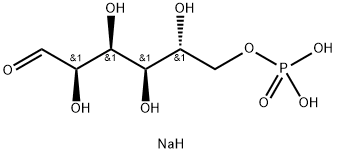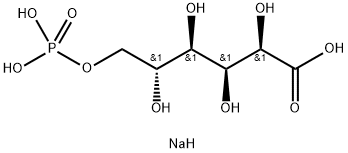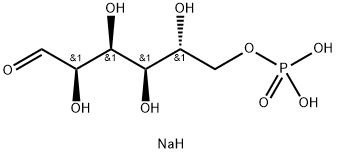ROBISON ESTER MONOSODIUM SALT
Synonym(s):α-D-Glucose-6-phosphate, Monosodium Salt - CAS 54010-71-8 - Calbiochem;D (+)-Glucopyranose 6-phosphate sodium salt;G-6-P Na;Robison ester
- CAS NO.:54010-71-8
- Empirical Formula: C6H14NaO9P
- Molecular Weight: 284.13
- MDL number: MFCD00136039
- EINECS: 258-921-0
- SAFETY DATA SHEET (SDS)
- Update Date: 2025-01-27 09:38:02

What is ROBISON ESTER MONOSODIUM SALT?
Description
D-Glucose-6-phosphate is formed in cells when glucose is phosphorylated by hexokinase (or glucokinase) or by the conversion of glucose-1-phosphate by phosphoglucomutase, which is the first step of glycogen synthesis. It is stored as glycogen when blood glucose levels are high. Disruption of D-glucose-6-phosphate activity leads to glycogen storage disease type I or von Gierke’s disease, a group of inherited metabolic diseases characterized by severe hypoglycemia, growth retardation, and hepatomegaly, due to accumulation of glycogen and fat in the liver. D-Glucose-6-phosphate is also the starting molecule of both glycolysis and the pentose phosphate pathways. Because cancer cells adopt glycolysis as a major source of metabolic energy production, and the pentose phosphate pathway plays a role in helping glycolytic cancer cells to meet their anabolic demands, this compound can be used to study the progression of this process.
Chemical properties
White crystalline solid
What are the applications of Application
D-Glucose-6-phosphate monosodium salt is a reagent and enzyme substrate for glucose-6-phosphate dehydrogenase
What are the applications of Application
D-Glucose 6-phosphate sodium salt solution is a phosphorylated Glucose derivative
General Description
A glycolytic intermediate that also acts as a competitive and reversible inhibitor of hexokinase. Useful in creating an ATP-regenerating system. Causes the release of mitochondrially bound hexokinase in muscle.
Purification Methods
It can be freed from metal impurities as described for glucose-1-phosphate. The solubility of the Na salt is 5% in H2O at 20o. Its barium salt can be purified by solution in dilute HCl and precipitation by neutralising the solution. The precipitate is washed with small volumes of cold water and dried in air. Alternatively the barium salt is dissolved in H2O, 4volumes of EtOH are added, the precipitate is collected, washed with 90% EtOH, absolute EtOH, 75% EtOH/25% Et2O, 25% EtOH/75% Et2O and finally dry Et2O. The dry Barium salt has [] D +17.9o (c 1, H2O). [Beilstein 1 IV.]
Properties of ROBISON ESTER MONOSODIUM SALT
| Melting point: | 204 °C (dec.)(lit.) |
| storage temp. | Sealed in dry,Room Temperature |
| solubility | H2O: 50 mg/mL, clear, colorless to very faintly yellow |
| form | crystalline |
| BRN | 5787568 |
| InChI | InChI=1/C6H13O9P.Na.H/c7-1-3(8)5(10)6(11)4(9)2-15-16(12,13)14;;/h1,3-6,8-11H,2H2,(H2,12,13,14);;/t3-,4+,5+,6+;;/s3 |
| CAS DataBase Reference | 54010-71-8(CAS DataBase Reference) |
Safety information for ROBISON ESTER MONOSODIUM SALT
| Signal word | Warning |
| Pictogram(s) |
 Exclamation Mark Irritant GHS07 |
| GHS Hazard Statements |
H315:Skin corrosion/irritation H319:Serious eye damage/eye irritation H335:Specific target organ toxicity, single exposure;Respiratory tract irritation |
| Precautionary Statement Codes |
P261:Avoid breathing dust/fume/gas/mist/vapours/spray. P271:Use only outdoors or in a well-ventilated area. P280:Wear protective gloves/protective clothing/eye protection/face protection. |
Computed Descriptors for ROBISON ESTER MONOSODIUM SALT
| InChIKey | RUFPTDNHMAGVMV-IWNCBHIWNA-N |
| SMILES | [C@@H](O)([C@H](O)COP(O)(O)=O)[C@H](O)[C@@H](O)C=O.[NaH] |&1:0,2,10,12,r| |
New Products
3-Iodophenylacetic acid 3-Pyridineacetonitrile, α-hydroxy- 2-Propanamine, 1-chloro-, hydrochloride (9CI) 3-(hexyloxy)-4-(pyridin-3-yl)-1,2,5-thiadiazole 2-Hexyn-1-ol Dibenzo-18-crown-6 Nickel(II) perchlorate hexahydrate, 98% 4-Bromophenylacetonitrile, 95% 3-Bromo-4-fluoroaniline, 97% Sodium tetraborate decahydrate, 98% Palladium(II) acetate, trimer, Pd 99% 4-Bromo-2-chlorotoluene, 97% N N Dimethylformamide Dimethyl Acetal (Dmf Dma) 2,3-Dichloro Benzoyl Cyanide [Side Chain] Bis(2-Chloroethyl) Amine Hydrochloride L-Glutamic Acid Diethyl Ester Hydrochloride 5-(Difluoromethoxy)-2-Mercaptobenzimidazole 1-Ethyl-3-(3-Dimethylaminopropyl)-Carbodiimide Hydrochloride [EDC Hcl] 1,4-Napthoquinone Bromoiodomethane Sodium Bicarbonate Methylene Dichloride (MDC) Ethyl Acetate Indole-3-Carbinol (I3C)Related products of tetrahydrofuran







![GLUCOSE 6-PHOSPHATE, DISODIUM SALT, D-, [6-3H]](https://img.chemicalbook.in/StructureFile/ChemBookStructure2/GIF/CB3147465.gif)
You may like
-
 D-Glucose-6-phosphate monosodium salt 95% CAS 54010-71-8View Details
D-Glucose-6-phosphate monosodium salt 95% CAS 54010-71-8View Details
54010-71-8 -
 D-Glucose 6-phosphate sodium salt CAS 54010-71-8View Details
D-Glucose 6-phosphate sodium salt CAS 54010-71-8View Details
54010-71-8 -
 17604-74-9 3-Pyridineacetonitrile, α-hydroxy- 98+View Details
17604-74-9 3-Pyridineacetonitrile, α-hydroxy- 98+View Details
17604-74-9 -
 131987-69-4 98+View Details
131987-69-4 98+View Details
131987-69-4 -
 Cyclohexane, (2-propynyloxy)- 67967-07-1 98+View Details
Cyclohexane, (2-propynyloxy)- 67967-07-1 98+View Details
67967-07-1 -
 2-Propanamine, 1-chloro-, hydrochloride (9CI) 98+View Details
2-Propanamine, 1-chloro-, hydrochloride (9CI) 98+View Details
5968-21-8 -
 3-Iodophenylacetic acid 1878-69-9 98+View Details
3-Iodophenylacetic acid 1878-69-9 98+View Details
1878-69-9 -
 132945-75-6 (S)-1-Boc-3-methanesulfonyloxy-pyrrolidine 98+View Details
132945-75-6 (S)-1-Boc-3-methanesulfonyloxy-pyrrolidine 98+View Details
132945-75-6
